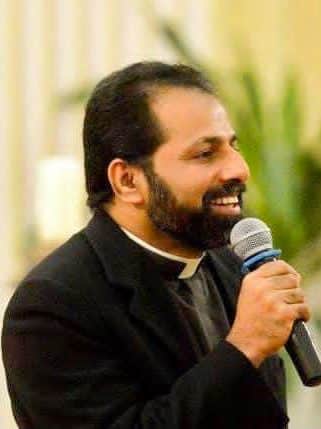
John 1:6-8, 19-28

This gospel reading from the Third Sunday of Advent introduces John the Baptist who came to prepare the way for the Messiah. The Messiah is mentioned as the light. John’s mission is to give testimony to the light. Later we will hear Jesus saying of himself that he is the light of the world (John. 8:12). He would ask his disciples too to become the light of the world (Matthew 5:14). Darkness is easily understood as a metaphor for evil, negativity, despair and lack of peace and clarity. The light has an ability to make things appear clearly. Spiritually, it refers to the ability to weigh the values of things and discern what is true and what is fake. Light gives new perspectives to things that were seen vaguely in shadows and darkness. Only in Christ, can we assess the value of things in this world and the next.
There is more to this voice that came to prepare the way of the Lord than just a passing sound. He not only prepares the way, but also gives way to the Messiah. John is a blameless holy man and an appreciated prophet. People could have easily mistaken him for the Messiah and some did indeed as we see in the gospel narrative. He could have taken advantage of that! But he gives way. Giving way is the noblest way. When people flocked around Jesus whom he baptised, he says, “he should increase and I should decrease.” What a nobility and sense of purpose in his words!
The stories of people who give way are amazing stories of divine sparks in human nature. For example, in St. John’s resurrection narrative, we find Peter and John running together to the tomb (John 20). John reaches the tomb first, but very nobly he lets Peter enter the tomb first. Christian nobility glows in such sacrificial renunciation. John had heard Jesus advising his disciples when seeing the guests rushing to pick up prominent places in a banquet. “When you are invited for a dinner take the last seat, not the first,” inviting for nobility to give way to others.
One of the less narrated stories is about David’s desire to build a temple for the Lord (1 Chronicles 22). He was passionate about it, convinced about it. He was worried that it was not right that he lived in a cedar house when the Ark of the Covenant was in a tent. But the prophet, Nathan, came and told him that he could not build a house for God because his hands were stained with blood. David listens to the prophet and humbly gives way to the next generation.
We are familiar with political stories of those who refuse to give way. Some are passionately attached to power, or to their own delusions of importance. Some are afraid to give way because they believe those who succeed will not do as good. Are we actually that important? So important as not to have a replacement?
It was such an encouraging moment to see when Pope Benedict gave way to Pope Francis, silently, with total renunciation and disinterestedness. He looks at the new pope with love and admiration, giving not the slightest feeling of disagreement, though their leadership styles are visibly different.
Father Jijo Kandamkulathy CMF
Claretian Publications, Macau

